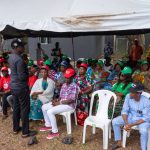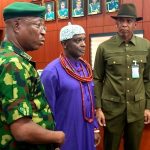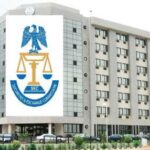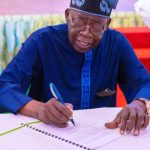Onolememen tasks media, CSOs to expose “electoral corruption”
May 16, 2018

FORMER MINISTER OF WORKS MIKE ONOLEMEMEN SPEAKING AT A PUBLIC LECTURE ON DEMOCRACY AND GOOD GOVERNANCE IN SUB-SAHARAN AFRICA, IN NEW YORK
Former Minister of Works Mike Onolememen has called on the media and civil society groups to expose what he termed “electoral corruption” in the sub-Saharan African countries
Onolememen made the call in New York at a Public Lecture entitled: ‘Role of Media and Civil Society Groups in Expanding Democratic Participation and Ensuring Good Governance in Sub-Saharan Africa’.
The former minister under former President Goodluck Jonathan’s administration, said at the lecture, hosted by Center for Media and Peace Initiatives (CMPI), that there was the need to engender good governance in the region.
He said: “The media and civil society groups should not only be at the vanguard of educating citizens on their rights to participate in the democratic process.
“They should also set political and social agenda that could be beneficial to citizens, as well as help expose any act of electoral corruption.
“This is with the aim of ensuring the emergence of credible processes of electioneering that will guarantee that the wishes of citizen-voters are respected.
“Clearly, an unbiased media, in conjunction with proactive civil society groups that help to give political education to citizens, have the potential of changing the narratives of citizens participation in democratic governance in sub-Saharan African countries for the better”.

L-R: FORMER MINISTER OF WORKS MIKE ONOLEMEMEN; AU AMBASSADOR TO THE UN, MS FATIMA KYARI-MOHAMMED; PRESIDENT, CENTER FOR MEDIA AND PEACE INITIATIVES (CMPI), UCHENNA EKWO; AND VICE-PRESIDENT PROGRAMME DEVELOPMENT, CMPI, ROBERT BENSTEIN AT A PUBLIC LECTURE ON DEMOCRACY AND GOOD GOVERNANCE IN SUB-SAHARAN AFRICA, ORGANISED BY CMPI IN NEW YORK
The former minister regretted that citizens’ participation in the democratic process was low in the sub-region because elections were not free and fair.
“When citizens are disillusioned by repeated electoral fraud, marked by violence and non-transparent elections, with sometimes, non-reflective poll results, general apathy among citizens set in, leading to future non-participation in the democratic process.
“In Nigeria for example, virtually all Local Government elections organised by the various state governments not only fall short of the standards, the processes are manipulated and votes allocated without any bearing with the actual field exercise.
“The consequences have been the denial of good governance to the people of the 774 local governments in Nigeria, and the repeated boycott of local government elections by opposition political parties in most of the states.
“The Kano State example was made worse by under-aged voters, which led to a national outcry, forcing the national electoral body to commence investigation into how these under-aged voters were registered in the first place.”
To forestall the trend, Onolememen, also former Minister of State for Defence, said security agencies, electoral bodies and other public service should pledge loyalty to the country and not to heads of governments or individuals.
According to him, this is especially important when it comes to the succession of one government by another as a result of the electioneering process, as witnessed in some of the countries.
The former minister said: “The disappointing examples of Cote d’Ivoire and The Gambia, where sitting presidents initially refused to leave office after electoral defeats, are still fresh in our minds.
“However, the shinning succession examples from Nigeria in 2015, Ghana in 2016 and Zimbabwe in 2017, as well as Liberia and Sierra Leone in 2018, have rekindled hope”.
“The Judicial Service Commission that has responsibility for appointing and discipline judges should be saddled with the responsibility of appointing and screening national and state electoral officers, to midwife credible elections.
“Inclusion of the representatives of registered political parties participating in elections as part-time members of the electoral bodies, may also be helpful in the quest for transparent elections”.
According to him, electoral bodies in sub-Saharan Africa must pledge allegiance to the constitution of their countries by being patriotic in the discharge of their sacred responsibilities.
The former minister concluded: “Based on recent experiences, I make bold to say that sub-Saharan African countries have no need for strong and dictatorial leaders.
“Rather, what is needed are strong institutions that will guarantee enhanced citizens participation in the democratic process, and capable of holding the political leadership accountable in public governance”.
The Permanent Observer of AU to the UN, Ms Fatima Kyari-Mohammed, decried the prevalence of “fake news” and the potential adverse effects to manipulate citizens and distort facts critical in public policy formulation and implementation.
President of CMPI, Dr Uchenna Ekwo, reviewed the emerging transnational media and political environments, and the influence of unfettered exchange of ideas, culture, and openness in global policy agenda.








